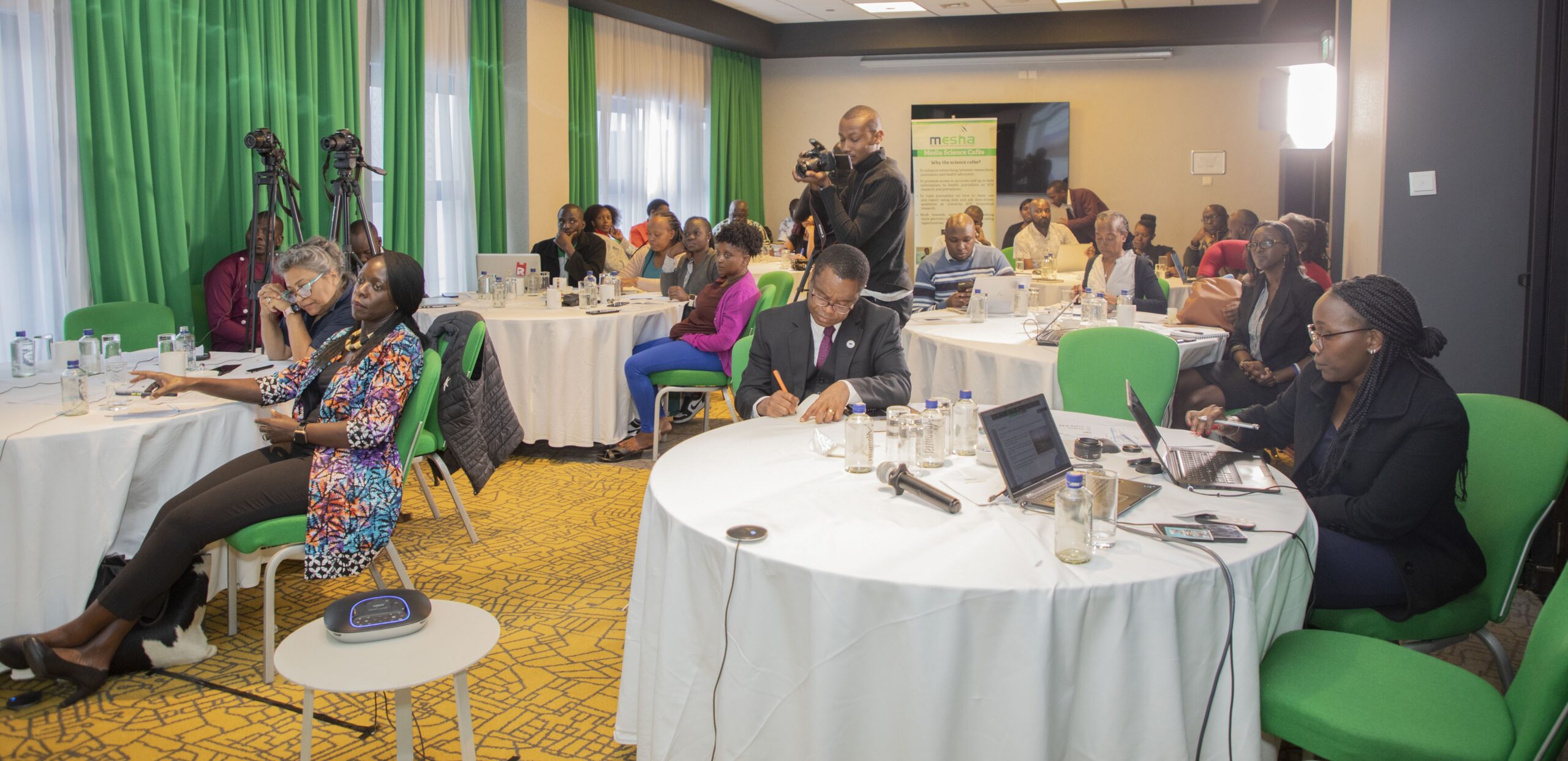
From the left: Fred Kwame (AWF), Ken Mwathe (BirdLife International), Rubina James (ABCG), and Paul Gacheru (Nature Kenya)
The inaugural ABCG and MESHA science cafe took place in Nairobi, Kenya on August 22, 2023, bringing together conservation experts and media science personnel from national and regional media. This event presented an opportunity for conservation leaders to network and build relationships with the Media for Environment, Science, Health, and Agriculture (MESHA) journalists while discussing current biodiversity issues.
MESHA is a Kenyan-based association of writers, journalists, and communicators who specialize in reporting science for development. MESHA members cover stories in areas such as healthcare, agriculture, and the environment with a special focus on rural issues. The association has been at the forefront of supporting interventions that address challenges facing rural and urban populations. This has included looking at remedies and research for agriculture, health, technology, and the environment as well as looking at how policies that govern the employment of these solutions are crafted.
Realizing the Global Biodiversity Framework for achieving sustainable development in Africa was the main topic for discussion with speakers drawn from the African Wildlife Foundation, BirdLife, Nature Kenya and ABCG.
The media has an important role as agenda setters and decision-makers while wielding the power to shift the narrative to ensure conservation is given the priority and attention it deserves in order to push for the much-needed transformation, said Fred Kwame, Vice President, Global Leadership at African Wildlife Foundation.
Fred noted that “nature’s value is immeasurable, yet often unaccounted for, biodiversity contributes at least $125 trillion annually to global economies”. Nature supports all humanity and economic activity and therefore achieving sustainable development in Africa calls for us to correctly account for the value of nature.
“As home to over a third of global ecosystems, nature essentially presents Africa with an untapped investment and green development opportunity and is a key strategic asset that can be used as bargaining power in the global arena” Fred added.

A Photo of the audience taken during the media science cafe, on August 22, 2023.
Ken Mwathe Policy, Climate, and Communications Coordinator Africa at BirdLife International discussed on the progress made in realizing key outcomes of COP 27 and looking ahead at COP 28. Among others, he highlighted the need to shift focus from tree planting and re-focus on ecosystem restoration. Ecosystem restoration is holistic and provides multiple benefits including adaptation, mitigation, soil restoration, land productivity as well as livelihood opportunities for local communities.
Kenya, is facing huge challenges when it comes to balancing development and biodiversity conservation, development projects have resulted in habitat loss and degradation, said Paul Gacheru, Program Manager, Nature Kenya. There is a need for the country’s to be development-conscious and avoid further destruction and degradation of the environment.
Promoting biodiversity and conserving our ecosystems requires collaboration from all of us and all sectors must join hands in these efforts. Rubina James, ABCG Director, assured the journalist of the support and willingness of the conservation colleagues to collaborate with them and provide the necessary data and information required in covering conservation issues.
This event served as a powerful platform for change in the conservation space. It illuminated the critical need for collaboration, forging connections between conservation leaders and the media to unite these influential sectors in the mission of biodiversity conservation. There is no denying, that there is an urgent need for donors to meet the climate financing commitments and also address the adaptation finance gap, which is essential to combat climate change impacts effectively. Additionally, the upcoming 28th Conference of Parties (COP 28) is a pivotal opportunity to prioritize nature, reduce carbon emissions, and actualize the Loss and Damage Fund established at COP 27. With crucial issues being addressed, from biodiversity to climate change mitigation, and financing, the media is a valuable force capable of steering the narrative and propelling these crucial issues at the forefront to the right stakeholders.
Media Science Cafe Coverage
Africa can use nature for power bargain – Environmentalists say, The Star, August 30, 2023.
Climate change: Governments urged to seize the moment at COP28, MESHA August 29, 2023.
There is an Urgent Need to Heal Humanity’s Broken Relationship with Nature, Talk Africa, August 25, 2023.
African Countries Urged to Invest Adequately in Biodiversity, Science Africa, August 31, 2023.
Climate experts urge developed countries and donors to fulfill funding pledges on the ongoing adverse effects of climate change, Health Business, September 7, 2023.

